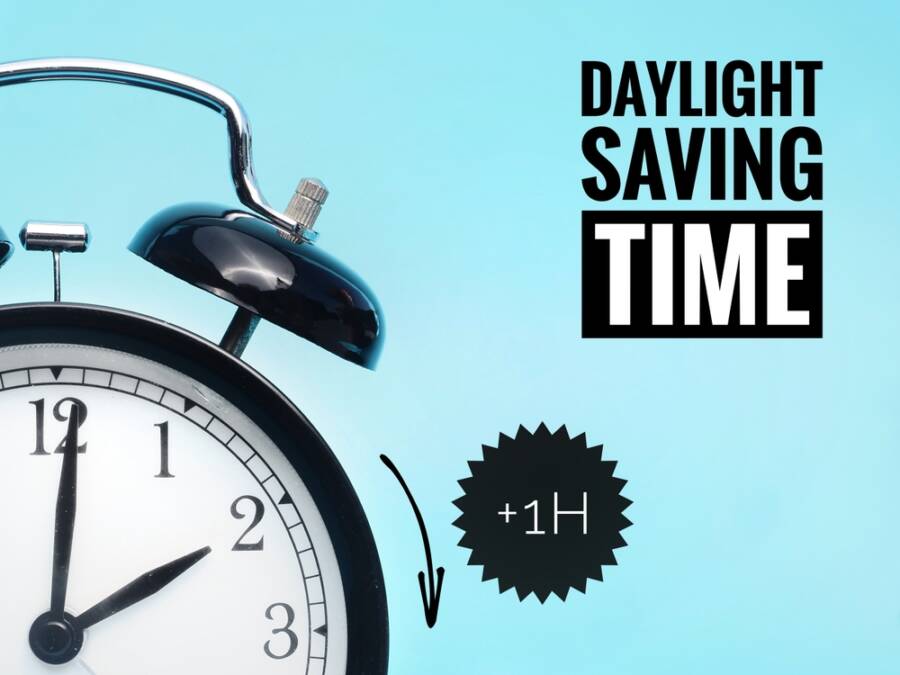Can daylight saving time affect our health THAT much?
Sleep deficiency is associated with a plethora of health issues, including weight gain, an increased risk of cardiovascular possibilities like heart disease and high blood pressure, and a weakened immune system, making you more vulnerable to infectious illnesses.
Recently, there’s been more data indicating a link between insufficient sleep and neurodegenerative diseases.
With that in mind, we spoke to experts and discovered that shifting clocks can leave many of us sleep-deprived the day after that, and specialists have dubbed it “Sleepy Monday.”
A Behavioral Sleep Medicine Research Program in San Francisco specializing in treating people with sleep disorders tells us what happens when we miss those precious Zzz’s… and how badly springing forward temporarily sets our sleep back.
Here are 7 ways daylight saving time can affect our health… and what you can do about it!

Physical health impacts of daylight saving time
It turns out, there’s an ample amount of evidence indicating that DST impacts our bodies physically. Let’s begin with your sleep cycle.
During the spring, adjusting your clocks one hour ahead can throw off your body’s internal clock because you go to bed later and wake up sooner than usual. And this doesn’t just go away on its own. It can pretty much last as long as daylight saving time does.
Influence of daylight saving time on mental health
One of the most significant results of DST is a lack of sleep, specifically when you spring ahead. When your body doesn’t get enough sleep, it affects the frontal lobe of your brain. Think of this area as your best friend who won’t let you act out on whims.
When you don’t sleep well or receive enough of it, it influences your frontal lobe’s capacity to make rational decisions. As a result, you’re more prone to make impulse judgments. Meanwhile, as the later months of the year continue, your body doesn’t obtain as much sunlight.
When this happens, it fails to produce the right amount of serotonin, which is a mood-boosting chemical. In turn, you feel your energy drained, and you may be more sensitive to mood swings, which could put you at a higher risk for depression.
The AARP discovered that once people set back their clocks in the fall, there was an 11% growth in depression.
Impact of daylight saving time on Older adults
Older adults seem to experience lots of sleep disruption issues due to DST. Because of this, it’s vital to refrain from operating heavy machinery when sleep-deprived because your body’s frontal lobe won’t process information quickly enough, resulting in impulse decisions that can increase the risk of accidents.
On top of this, it’s also crucial to adhere to medication and meal times. As individuals age, they may need clarification on what time it is based on the changing environment outdoors.
Changes in social interactions and relationships during daylight saving time
The Wall Street Journal discovered that DST can also negatively influence our relationships. Think about those periods when you lack sleep: you tend to be more irritable, quick to react, and don’t listen to those around you.
This creates an edgy situation where you can fight more with loved ones, friends, and colleagues. Even worse, you might isolate yourself altogether.
When you’re feeling exhausted, you’re less likely to engage in social events since you’re already too tired, and the mere thought of attending them causes more tension.

Impact of daylight saving time on exercise routines and physical activity levels
DST also negatively influences physical activities as well. Because you can experience more exhaustion from a lack of sleep, you’re less inclined to participate in more physically demanding exercises, which can enhance your mental and physical health.
Furthermore, because your body may be sleep-deprived, it can produce increased levels of cortisol, which we all know is the stress hormone. High cortisol levels can result in muscle weakness, rapid weight gain, and higher blood pressure.
Impact of daylight saving time on individuals with pre-existing health conditions
Daylight saving time can worsen pre-existing health conditions by elevating risk factors. For example, if you have higher blood pressure, DST can affect your sleep quality.
Over time, this can heighten your heart rate and increase your blood pressure even more, making you more at risk for having a stroke. That’s why if you have an underlying health condition, it’s important to consult with your doctor about ways to mitigate DST’s consequences.
Link between daylight saving time and an increase in Fatal Motor Vehicle Accidents
A 2020 study published in Current Biology analyzed 700,000 motor vehicle accidents over a period of 20 years and discovered that the yearly switch to daylight saving time is connected to a 6% increase in fatal car accidents during the work week after the time change.
An intriguing finding was that fatalities also rose when the Energy Policy Act expanded daylight-saving time to March rather than April. Before that moment, there was a consistent growth in deaths in April following the time change that happened during those years.
The study also revealed changes in accident patterns following the “fall back” time change, with a decrease in morning accidents and a spike at night when darkness comes sooner. These effects were also attributed to disturbances in sleep.
The authors indicate that it’s better for our sleep schedule, the body clock, and our overall health to have more morning light and less evening light during standard time.

Tips for preparing for daylight saving time
Let’s begin with when daylight saving begins. Always check a news outlet for this information. Knowing this ahead of time can help you take specific steps to prepare your body for the changes it will face. Here are 5 useful tips:
1. Find creative outlets: Winter is brutal because the sun isn’t out much, and it can become easy to feel depressed and isolated. When you can’t be outside to exercise, find a creative hobby that’ll allow you to concentrate on something else with a goal in mind. Setting and accomplishing goals is a fantastic way to boost dopamine and serotonin production, which can ward off depression and anxiety.
2. Set a sleep schedule: As you approach the time to adjust your clocks ahead by an hour, work on your sleep schedule accordingly. Begin by getting in bed 15 minutes earlier every night. Start a couple of weeks before you set your clock and increase each week in 15-minute intervals until you go to bed one hour early. This could seem senseless on the surface, but it also prepares your body for the time change that’ll come soon.
3. Adjust exercises for maximum sunshine: If you’re used to taking a long walk in the afternoons in during the warmer months, change this to the mornings in the fall and winter. This will permit you to get more sunlight, which in turn will boost serotonin production.
4. Get rid of distractions: Don’t drink coffee, eat spicy food, or play on your phone right before climbing into bed. Instead, take some time to wind down, read a book, or simply space out.
5. Set your mealtimes: If you were used to eating dinner at 7 pm sharp before you switched to daylight saving time, keep that same time moving forward. Similar to your sleeping schedule, adjust meal times by 15-minute intervals as you approach daylight saving time.
We hope you found this article informative. For ore like this, be sure to check out our other related articles, including: 9 Problematic Sleeping Habits That Are Damaging Your Health














One Response